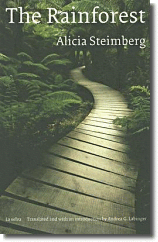A synopsis of the novel, from the publisher:

I contacted Alicia at home in Argentina and asked her to apply the "page 69 test" to her book. Here is what she reported:For middle-aged Cecilia, the rainforest represents both solace and tenuously controlled danger, as she discovers when she follows the same path each day from her hotel at a Brazilian spa into the surrounding jungle. Although her daily forays are designed to help leave her painful past behind, Cecilia’s thoughts return to her deceased husband, her drug-addicted son, and her own place in the world. These thoughts are her only company until the present intrudes once more in the unlikely form of a fellow patient at the spa, a North American man who might represent a second chance.
In The Rainforest, the award-winning novelist Alicia Steimberg offers the reader new definitions of happiness and mature love—or perhaps simply the reassurance that in life, nothing is ever quite as terrible as one fears or quite as glorious as one remembers.
It is perfectly representative of the book. I'm sure there is a word in English to say it is the page that condenses and puts an end to the first act of this terrible drama, because that is what The Rainforest is, the terrible drama of a mother and her son when they both undergo the effects of drug addiction on the boy. Once a friend, also a writer, asked me what had "really happened in real life" as compared to the story told in the book, and when I enumerated what had really happened and what didn’t, we both laughed. Everything that was negative, even tormenting and awful in the book had happened in reality. Everything that was reassuring and nice had been invented. I'll say more: I can't say I like going back into this, even though in my "real life," also in my son's, things are much better now: my real son has miraculously recovered, after many years of suffering and anguish: he’s the father of two marvelous kids, Ezequiel, 12, and Iván, 8, who are a joy to love and watch while they are growing up; and we have become "just a happy family.” I'm the sort of writer who seldom drifts apart from her own experience, but The Rainforest, unlike any other of my books, portrays what I consider the worst part of my life, worse than my father's untimely death when I was eight and my brother was four, worse than being left with my harsh, mentally deranged mother until I was able to disentangle myself from her and start feeling free, relatively free, of course, in the world of the educated porteño middle-middle class. Funny: I'm much happier now, at 73, than I was at the time I wrote The Rainforest.Many thanks to Alicia for the feedback.
To read an excerpt from The Rainforest, click here. Click here and here to read more praise for the novel.
Critics also praised Alicia's previous novel, Call Me Magdalena:
The translator for these and other works is Andrea G. Labinger, a professor of Spanish and honors director at the University of La Verne in Claremont, California. Andrea not only helped me put together this item but also agreed to share the translator's take on "the page 69" test. I'll run her response later this week; watch this space."Steimberg's simple and evocative prose distinguishes this 1992 Planeta Prize-winning novel about the quest of a young Arg
entine woman to understand her history and her heritage. The granddaughter of Russian Jews who emigrated to Argentina, and the daughter of parents indifferent to Judaism who embrace Argentine society, she is in a kind of cultural limbo, caught between one world she cannot forget and another she wants to embrace."--Publishers Weekly.
"All sorts of genres are imperturbably parodied in this witty, prizewinning 1992 novel from the Argentinean author of Musicians and Watchmakers. . . . Intricate, sensuous, and frequently hilarious: very much like a really good Luis Buñuel film. Steimberg is one of Latin America's best writers."--Kirkus Reviews.
Previous "page 69 tests":
Alan Wolfe, Does American Democracy Still Work?
John Dickerson, On Her Trail
Marcus Sakey, The Blade Itself
Randy Boyagoda, Governor of the Northern Province
John Gittings, The Changing Face of China
Rachel Kadish, Tolstoy Lied
Eric Rauchway, Blessed Among Nations
Tim Brookes, Guitar and other books
Ruth Padel, Tigers in Red Weather
William Haywood Henderson, Augusta Locke
Jed Horne, Breach of Faith
Robert Greer, The Fourth Perspective
David Plotz, The Genius Factory
Michael Allen Dymmoch, White Tiger
Patrick Thaddeus Jackson, Civilizing the Enemy
Tom Lutz, Doing Nothing
Libby Fischer Hellmann, A Shot To Die For
Nelson Algren, The Man With the Golden Arm
Bob Harris, Prisoner of Trebekistan
Elaine Flinn, Deadly Collection
Louise Welsh, The Bullet Trick
Gregg Hurwitz, Last Shot
Martha Powers, Death Angel
N.M. Kelby, Whale Season
Mario Acevedo, The Nymphos of Rocky Flats
Dominic Smith, The Mercury Visions of Louis Daguerre
Simon Blackburn, Lust
Linda L. Richards, Calculated Loss
Kevin Guilfoile, Cast of Shadows
Ronlyn Domingue, The Mercy of Thin Air
Shari Caudron, Who Are You People?
Marisha Pessl, Special Topics in Calamity Physics
John Sutherland, How to Read a Novel
Steven Miles, Oath Betrayed
Alan Brown, Audrey Hepburn's Neck
Richard Dawkins, The Ancestor's Tale
--Marshal Zeringue





